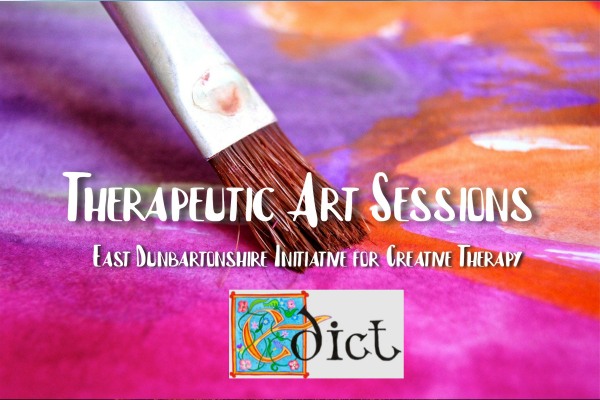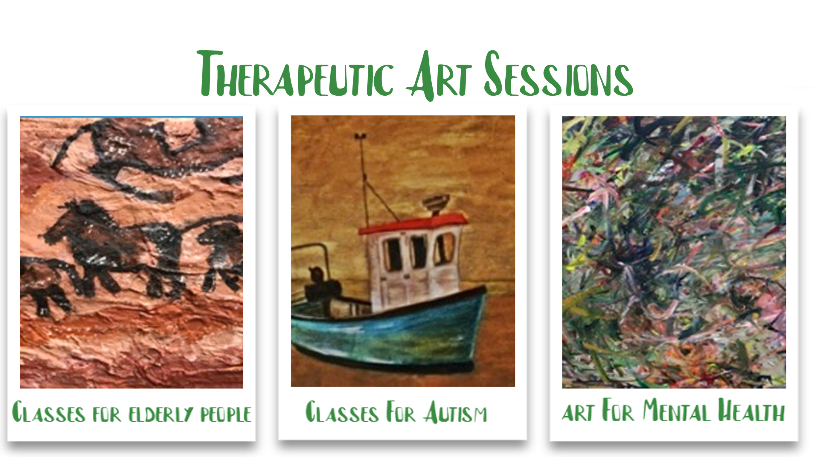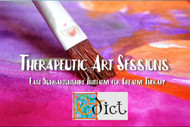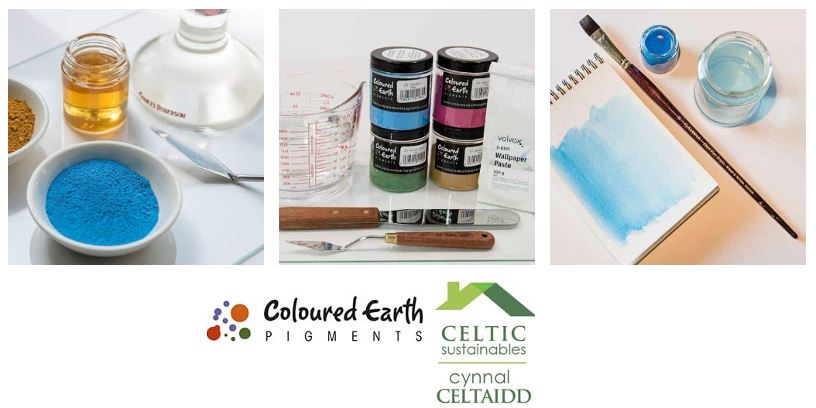CASE STUDY: Therapeutic Art Sessions using Coloured Earth Pigments
Posted by Celtic sustainables on 12th Jun 2023
Therapeutic art sessions using non-toxic pigments with EDICT: East Dunbartonshire Initiative for Creative Therapy

EDICT is a charity based in Kirkintilloch that helps people with a range of mental & physical health conditions. EDICT is a Scottish Charitable Incorporated Organisation based in Bishopbriggs, Glasgow. Colin Campbell founded EDICT on the 30th of January 1997 in response to local government reorganisation in Scotland and the need for new services within the new regional government framework. After providing some information to Colin regarding the Coloured Earth Pigments, we just had to find out more about what he intended to use them for and how he would incorporate them into his therapeutic art sessions.
Colin and his team provide studio sessions where participants can explore their creative ideas. This often involves teaching new techniques and experimenting with various media. There are two studio sessions daily, morning and afternoon, five days per week, with sessions for those on the autism spectrum taking place three evenings per week and all-day Saturday. Through the art sessions, they can support individuals with dementia and the early stages of Alzheimer’s disease, focusing on the whole person rather than just addressing the nature of their mental condition. They also offer regular support services for children & young adults with autism spectrum conditions. It allows them to make the studio space their own, allowing them to develop the kind of informal social links other teenagers take for granted, thereby enabling them to practice the social protocols which often puzzle them.
EDICT offers therapeutic art sessions that help people with a range of mental & physical health conditions. The act of painting allows people to live in the moment. As producing art is as intuitive as speech, many perceived concerns of dementia, autism, or other mental health issues, do not exist in the art studio. The charity gives adults and young adults a platform to help them express themselves, which is invaluable.
“For the first three years, it was just me, and my focus then was on supporting adults with mental health problems and their carers. Since then, the organisation has grown, and I now have three full-time members of staff and three part-time, as well as myself. Our service has grown to include adults with dementia; adults with traumatic brain injury; young adults and children on the autism spectrum, and the original service users.”

The impact of art on the environment
The art supplies industry is lined with toxic materials: plastics, lead-based paints, preservatives, etc. Longstanding traditional art practices and materials can be toxic to our health and harmful to the planet. Luckily, as in many other industries, sustainable options are on the rise; one method is to make your artist paint; see the making oil paint guide here.
During the sessions, they use a wide variety of materials and techniques. While painting is the most popular, they also routinely work with printmaking, mosaic, sculpture techniques, ceramics, batik, and anything else anyone fancies trying.
For several years, Colin has been very concerned by the number of synthetic paints they were either sending to a landfill or washing down the drain. During the covid lockdown, Colin seriously considered how they might end that waste and provide high-quality paints that did not harm the environment.
Experimenting with Pigments
“A simple Google search led me to Celtic Sustainables, where I was impressed and surprised by the range of available pigments. I have also been delighted by the personal interest the company has taken in our little efforts to be more environmentally aware.
I must say that I have enjoyed experimenting with various emulsions while developing our paint and have finally settled on a potato starch and linseed oil emulsion, which carries most of the pigments very well indeed, and the colour is water soluble, although one or two pigments have posed a bit of a problem; the Vivid Green pigment, for example, is prone to flocculation and I haven’t entirely found the solution yet.
I am confident that once we have ironed out some of the initial problems, we will use the paint to replace acrylic paint completely. Acrylic is the most popular medium for participants, particularly in the early stages of their time with us. In the future, I intend to use the pigments to make our oil paint (my personal preference). I am keen to explore the possibilities of producing printing ink for intaglio printmaking.
The challenge in making our paint is to make it as easy for the inexperienced artist; I believe we have achieved that by using the potato/ linseed emulsion. Most of our participants support our efforts and are helping us trial the new paint- so far, it’s thumbs up!”
We look forward to hearing from Colin and the team at EDICT and seeing how they got on making their paints, until then if you need more information about the art sessions they offer, head to their website: www.edictarts.co.uk
And for more tried and tested guides, Coloured Earth Pigments have easy to follow articles and how to use the pigments: www.colouredearthpigments.co.uk/faqs-guides
Happy experimenting! If you’ve found this helpful article, please share it so someone else can benefit from seeing it.
Don’t forget to share your achievements and before & after photos with friends and us, and remember to tag us # CelticSus on social media.



